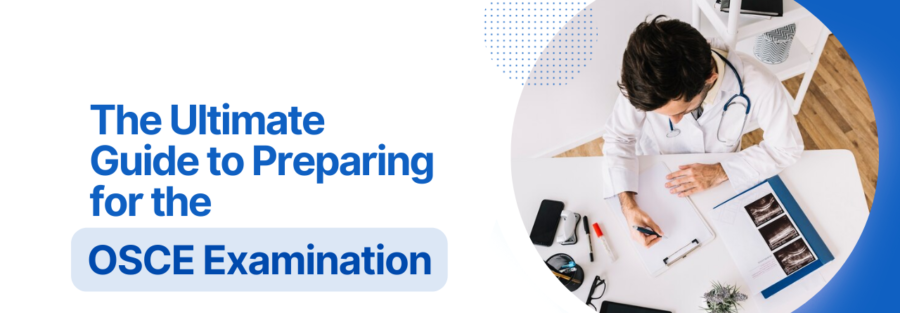The Objective Structured Clinical Examination (OSCE) stands as a pivotal gateway for medical professionals seeking to practice in Canada, particularly those navigating the Practice Ready Assessment. The OSCE Examination is used in various healthcare disciplines to assess the practical skills, clinical competence, and communication abilities of candidates.
Whether you’re a medical student, resident, or healthcare professional, preparing for the OSCE requires a strategic and comprehensive approach. Here’s everything you need to know to navigate the complexities of the OSCE and emerge successful.
Understanding the OSCE
The OSCE format involves multiple stations, where candidates rotate and perform specified tasks within a set time frame, typically 8 mins to 11mins . These stations test a wide array of skills, including history taking, physical examination, patient communication, and procedural skills, all within simulated clinical settings to mirror real-life situations as closely as possible.
Examiners assess candidates on various aspects, including history-taking, physical examination, communication, and problem-solving.
Examination Pattern and Syllabus
Understanding the format of the OSCE is crucial for effective preparation. The OSCE is carefully crafted to cover all aspects of the medical curriculum, ensuring a broad range of skills are assessed. It employs standardized patients and scenarios, with detailed scripts to ensure consistency in the information and emotional responses presented to all candidates. This structured approach helps in objectively evaluating clinical skills by providing marks for each correctly performed step according to a pre-defined mark scheme.
Preparing for the OSCE Examination
Prepare for the OSCE by focusing on practical skills and applying theoretical knowledge. Practice clinical methods repeatedly, understand the theory, and master timed tasks. Also, integrate ethical considerations for a well-rounded preparation.
Ethics is crucial in the OSCE Examination, emphasizing good behavior in medical practice. Candidates need to understand and apply ethical principles in real situations while keeping everything confidential. It’s not just about knowing the rules; it’s about using them in practice.
Tips for Success:
- Time Management
Manage time well during your study sessions. Allocate specific times for each part of a station, like history-taking, physical examination, and communication.
- Know the Format
Know the number and type of stations and the time allocated for each.
- Practice Clinically
Practice with patients or simulations and simulate the exam environment with mock OSCE stations to improve clinical skills and ease exam anxiety.
- Mock Exams
Engage in mock OSCEs for exam-like practice. Your educational institution or online platforms can organize these simulations, offering valuable experience.
- Theoretical Knowledge
Brush up on necessary theory, as some stations may require data interpretation or management plans.
- Self-Care
Ensure you are physically well-prepared for the examination. Prioritize your well-being with adequate rest, nutrition, and stress management to ensure peak performance.
- Celebrate Small Wins:
Acknowledge and celebrate your achievements during practice sessions. Building confidence through recognizing progress is essential for a positive mindset on OSCE examination day.
- Know When to Move On:
If you encounter a challenging question or scenario during the exam, don’t dwell on it excessively. Make a reasonable attempt, and if needed, move on to the next station to maximize your overall performance.
- Utilize Resources and Crash Courses
Leverage diverse resources for effective preparation – textbooks, online courses, and video tutorials offer valuable insights. Tailor your study using discipline-specific materials for targeted readiness.
Consider enrolling in an OSCE Crash Course for comprehensive and accelerated preparation. These courses cover various medical scenarios, ensuring you’re well-equipped for the diverse challenges in the examination.
Understanding the OSCE structure and expectations, coupled with thorough preparation, empowers candidates to face the examination confidently. The OSCE evaluates both clinical skills and the application of knowledge in real-world scenarios—a vital step toward becoming a competent healthcare professional.Consider seeking guidance from experienced tutors or platforms like TutorImg. At TutorImg you will get specialized sessions cover diverse scenarios tailored to medical specialties. Combining these tips with dedicated support will enhance your readiness for the OSCE examination. Elevate your preparation with Tutor IMG. Best of luck!




